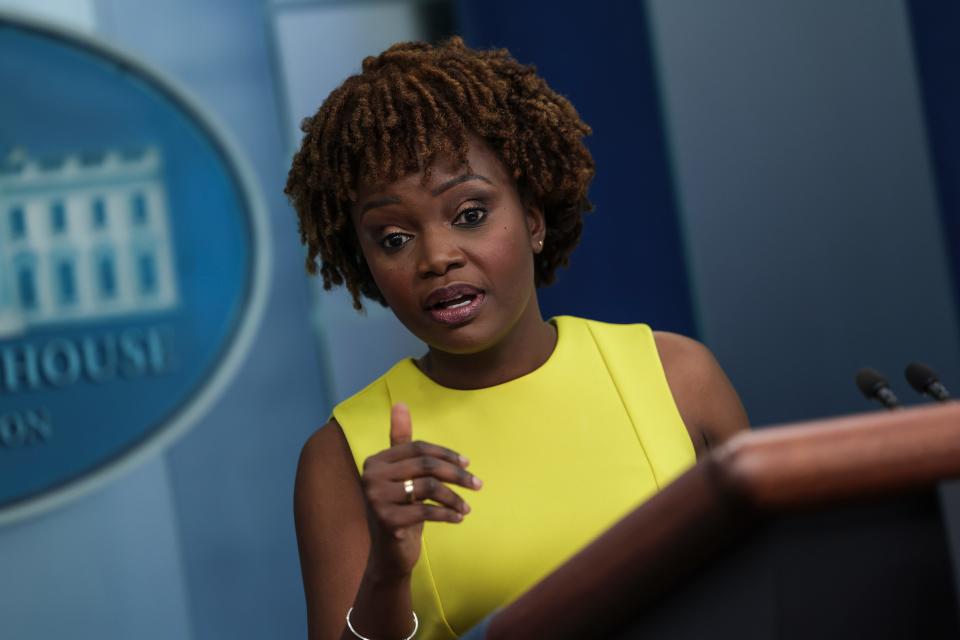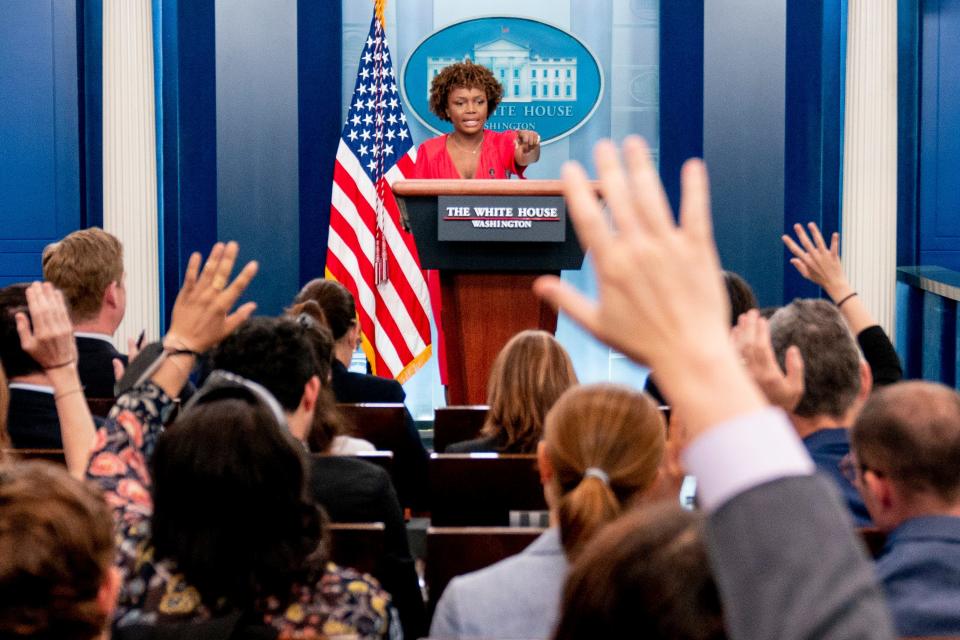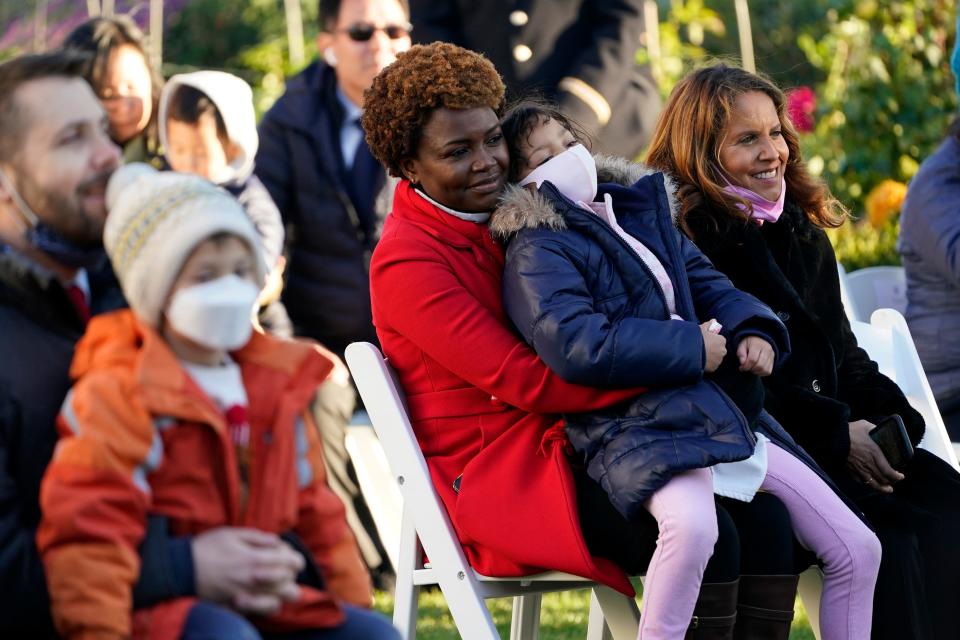'An out gay woman': Karine Jean-Pierre hopes to empower LGBTQ youth as White House press secretary
- Oops!Something went wrong.Please try again later.
- Oops!Something went wrong.Please try again later.
WASHINGTON – When she was 5, Karine Jean-Pierre knew she was different. Embarrassed and ashamed, she hid her feelings from her family for years.
When she was 16, she finally confessed her secret to her mother: She was gay.
“It devastated her,” Jean-Pierre, the White House press secretary, recalled in an interview with USA TODAY. “She hated – hated – the fact that I was gay or hated the fact that I said that to her. And it destroyed her.”
Jean-Pierre, who last month became the first openly gay person and first woman of color to become the top White House spokesperson, shares the story of her painful coming out to drive home a larger point for other young people who identify as LGBTQ but are too scared to live openly or whose own lives may be filled with trauma and angst.
Life does get better. She’s living proof.
Not only is she riding high professionally, “my mom loves my partner, my mom loves my kid, and my mom loves me – and has always loved me – but she loves everything about me now,” Jean-Pierre said from her West Wing office.
'A HISTORIC MOMENT': Meet Karine Jean-Pierre, the first Black woman and openly LGBTQ person to be White House press secretary

Jean-Pierre, a longtime adviser to President Joe Biden, said she hopes that through her high-profile position she can be the gay role model that she never had when she was a young woman trying to figure out who she was.
“I really, really hope that when people see me on TV or when they see me at the podium that they feel empowered, they feel that they can dream big or dream bigger, they feel that they can do it too,” she said.
While much has been made of the history-making part of her promotion, Jean-Pierre said it’s also important to not lose sight of why she got the job.
“I’m there because President Biden wants me to be there and thought I was the most qualified person to be there,” she said.
Though she’s the new press secretary, Jean-Pierre is not new to the White House or the press. For the first year and a half of the Biden administration, she served as the principal deputy press secretary, making her Biden’s No. 2 spokeswoman, behind press secretary Jen Psaki, who she would eventually succeed.
Filling in for Psaki, Jean-Pierre frequently briefed reporters in front of cameras from behind the White House podium and off camera aboard Air Force One. When Psaki got COVID-19 and was unable to accompany Biden to Italy and Scotland last fall, Jean-Pierre stepped in at the last minute and made the trip.
'DIGNITY AND RESPECT': How Joe Biden became the most LGBTQ-friendly president in U.S. history
'I stand on their shoulders'
On May 16, Jean-Pierre stepped behind the White House briefing room podium for the first time as the 35th White House press secretary.
She started by paying tribute to each of the 10 Black Americans gunned down at a supermarket in Buffalo, N.Y., two days earlier, provided updates on other topics and, before taking questions from reporters, paused to acknowledge the history of the moment.
“I am obviously acutely aware that my presence at this podium represents a few firsts,” she told reporters crammed into the room. “I am a Black, gay, immigrant woman, the first of all three of those to hold this position.”
Jean-Pierre noted that she would not be standing in the White House, speaking on behalf of the president, if not for the “generations of …. barrier-breaking people before me. I stand on their shoulders.”
In her interview with USA TODAY, Jean-Pierre said she feels the weight of responsibility that comes with being the first gay person and the first person of color to hold the job. It’s the same responsibility that any minority feels when they become the first to hold any job or position, she said.
“Being the first, you are looked at a little more closely, and that’s a reality that people of color have to deal with all the time,” she said. “That is not just being in this job. I think that’s being in any job. That’s just the culture that we’re in, the environment that we’re in. You are looked at as a woman of color – a Black woman – and looked at very, very differently than my predecessors.”
She points to Judge Ketanji Brown Jackson, who will become the first Black woman on the Supreme Court when she replaces Justice Stephen Breyer in a few weeks, as another example. During her four-day confirmation hearing in March, Jackson was besieged with questions from Republicans that some felt were patronizing or over the line, such as whether she thinks babies are racist and whether she can define the word "woman."
“Her resume was incredibly impressive,” Jean-Pierre said. Yet, “she was under a different microscope. That is something that, sadly, we are all judged very, very differently. I’m very aware of that.”
In Jean-Pierre’s case, the scrutiny is compounded by the fact that not only is she Black, she is openly gay and an immigrant. She was born in Martinique to Haitian parents. Her family immigrated to New York City when she was young, and it was there that she was raised.
Though her parents dreamed of her becoming a doctor, Jean-Pierre worked as a Democratic operative and political commentator, eventually landing a job in the White House’s Office of Political Affairs under President Barack Obama.
It was during that time that she met Biden, who was vice president. She served as a senior adviser to Biden during his presidential campaign in 2020 and followed him to the White House after he defeated Donald Trump.
Jean-Pierre works in a White House that has made diversity a priority. Biden has appointed more than 300 people who identify as LGBTQ to various positions in government. That amounts to about 14% of all his appointees to various agencies. They include high-profile officials such as Transportation Secretary Pete Buttigieg, Assistant Health Secretary Rachel Levine and Jean-Pierre.
Jean-Pierre said there is a sense of solidarity among the administration’s LGBTQ staff.
“You feel like people see you and understand you and know what you’re going through as well,” she said.
FIGHTING FALSEHOODS: Biden's pro-LGBTQ stance comes with a surge of anti-LGBTQ misinformation

'Viewed through a different lens'
Jean-Pierre took over the press secretary’s job during a difficult period for the Biden administration and for gay Americans.
Biden has faced a series of crises, including soaring inflation, mass shootings that have again ignited calls for stricter gun laws and a baby formula shortage that has left store shelves bare and incited panic among parents.
LGTBQ Americans, especially those who are transgender, are under attack in state legislatures in several conservative states, which are adopting new laws that strip away their rights.
Jean-Pierre’s promotion to press secretary is a significant step for gay Americans because she understands the issues and the challenges the community is facing, LGBTQ advocates say.
“Her understanding of these challenges intimately and knowing how deeply particularly transgender kids can feel these attacks and what it means to support community – I think that she understands this more deeply than anybody who's ever held that job,” said JoDee Winterhof, senior vice president of policy and political affairs for the Human Rights Campaign, the nation’s largest LGBTQ advocacy group.
With Jean-Pierre at the White House, “it means that our community has not only a voice, but somebody who understands and is at the table when other discussions are happening,” Winterhof said. “And we all know that that's one of the key things to make change in this world.”
Former Houston Mayor Annise Parker, who was one of the first openly gay mayors of a large U.S. city, knows what it’s like to be scrutinized more heavily than your predecessors.
“When you’re first at something and you accept that role, you realize that you’re going to be viewed through a different lens,” said Parker, president and CEO of the LGBTQ Victory Fund, which is dedicated to electing LGBTQ people to all levels of government.
“It doesn’t necessarily change what you do,” Parker said. “It doesn’t necessarily even make what you do harder.” But, “it makes your awareness of how you fit into the puzzle more critical and your awareness that whether you fail or succeed won’t just be viewed as about you, but about the next person who follows you, and the next and the next.”
For Jean-Pierre, “the fact that she’s a person of color, the fact that she’s a woman influences how she’s viewed and the pressures she’s under much more than men,” Parker said. “Then, she’s LGBT. That’s part of her identity. But just the fact that she’s there with all of those identities is important.”
Jean-Pierre not only embraces all of her identities, she believes they’ve made her stronger.
“The first thing somebody sees when they see me is my color,” she said. “Then I have chosen to be out – I have chosen to live my life as an out gay woman. That is a choice I am very proud of. I’m an immigrant – that is part of my story. So it all comes together. I am the person that I am because of all of those communities that I represent.”
AN ADVOCATE FOR THE CAUSE: US envoy advances LGBTQ rights in a world of 'mind-boggling' violence, discrimination

At home, a focus on family
When she was younger, Jean-Pierre said, she could never have imagined the life she’s living today – with a partner, Suzanne Malveaux, who is a national correspondent for CNN; a daughter, Soleil, who just turned 8; and a house on a cul-de-sac in the Washington suburbs.
At home, Jean-Pierre and Malveaux focus on family matters, like spending time together, juggling who will pick their daughter up from school and planning for birthdays and holidays. They seldom talk politics.
“We don’t even turn on cable,” Jean-Pierre said.
On the job and off, Jean-Pierre said she has been moved by the support she has gotten from other LGBTQ Americans since stepping into her new role.
“I hear from people in the community all the time, whether it’s a tweet, whether it’s email, whether it’s being out in the streets and bumping into people and people getting emotional and telling me how important it is and how my announcement, me being at the podium has impacted their lives,” she said.
“Truly, it’s wonderful to see.”
Michael Collins covers the White House. Follow him on Twitter @mcollinsNEWS.
FIGHTING DISCRIMINATION: LGBTQ communities face a perilous global landscape even as Biden pushes for protections
This article originally appeared on USA TODAY: Karine Jean-Pierre: New White House press secretary a gay role model

